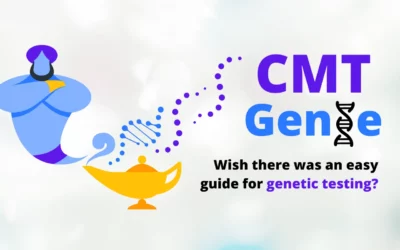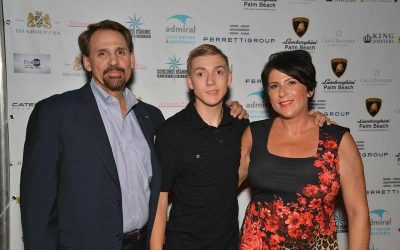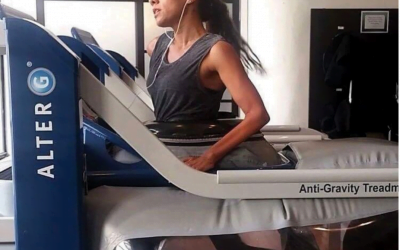 Growing up, I always knew I was different than my friends. I couldn’t run fast, tripped often (the scars on my knees are a reminder), was lousy at any sports-related activity, and was generally weak and uncoordinated. My friends accepted me as I was and didn’t really question it, but sometimes strangers would ask, “Why are you limping?” or, “What’s wrong with your leg?” I usually just brushed it off with some lame excuse like I was tired, or I “sprained” my ankle. I developed very effective coping mechanisms to hide my differences and, for the most part, it worked well.
Growing up, I always knew I was different than my friends. I couldn’t run fast, tripped often (the scars on my knees are a reminder), was lousy at any sports-related activity, and was generally weak and uncoordinated. My friends accepted me as I was and didn’t really question it, but sometimes strangers would ask, “Why are you limping?” or, “What’s wrong with your leg?” I usually just brushed it off with some lame excuse like I was tired, or I “sprained” my ankle. I developed very effective coping mechanisms to hide my differences and, for the most part, it worked well.
Looking back, I think it was more noticeable than I cared to admit, but most people were just too polite to say anything, but when someone was bold enough to ask, the question created a ton of embarrassment for me. I felt ashamed and humiliated. It was a completely irrational way to feel for something I was born with, but because I grew up not knowing there was a disease causing my problems or see myself as “abnormal” I did not even want to acknowledge it.
Charcot-Marie-Tooth (CMT) is an insidious disease that creeps up and progresses slowly. Gradually, you forget what walking properly actually feels like, or that you should have the ability to move your toes or do squats. So, for the first time in my life, I visited a chiropodist (deals with assessment, diagnosis, and treatment of the lower limbs), who assessed me walking barefoot. The look of shock and surprise on his face was alarming. He asked me to sit down and questioned why no one in my family had noticed the way I walked. How had I managed to go this long without a diagnosis? He used words like “neurological,” “serious,” and “disease.” I was scared and felt like I had just received a death sentence. He confirmed that I had CMT1A. Mystery solved. I was relieved in a way. I didn’t care to know about all the things that could happen to me in the future. I just wanted to live my life. I continued on through law school, got married, was focused on work and family. I was in my mid-twenties at that point. Unfortunately, shortly after getting married, the disease seemed to escalate its downward progression.
We wanted to start a family right away. I learned that CMT was one of the diseases that could be tested for using Preimplantation Genetic Diagnosis (PGD). This involves in vitro fertilization process with the extra step of performing genetic testing on the embryos prior to implantation in order to transfer the embryos that are free of CMT. I felt very fortunate that this process was available because it gave me a sense of control over ensuring that my CMT did not persist into the next generation. I was consumed with fear over how my husband would be affected if my CMT was passed on to our child. Would he blame me? Would he resent me? And how would I myself deal with the guilt if my child was more severely afflicted than I was? It was for all these reasons that we opted for PGD. As it turned out, the in vitro process was unsuccessful for us and it was heartbreaking because we knew that all the embryos were healthy. So we let it go and I became pregnant naturally about a year later. We were prepared for whatever outcome God chose for us and were blessed with a healthy baby girl, followed by another precious daughter a few years later. Many couples are successful with PGD and this procedure may be a viable option for those who are struggling with the decision of whether to have children.
Fast forward 15 years later, two beautiful children, now 40 years old. I am beginning a new chapter in my life. I have let go of the shame. I have let go of the embarrassment. I am telling people that I have CMT. I was fearful about what people would say, what they would think, how I would be regarded. Those self-limiting beliefs that had kept me immobilized and isolated were all in my head. No one cared that I had CMT! Nothing changed in how they treated me. In fact, it has been liberating. It has been a tremendous relief because I do not have to pretend or put up a front anymore! I can just be me. My friends and family have embraced me without making the CMT front and center. It’s just a part of me, but not the essence of me.
Now I am doing things that I never would have done, even just a few years ago. Recent changes in my personal life have forced me to wake up and break free of old programs, find the real me, be who I really am, love myself, gain back the confidence that I once had. I look in the mirror and I like what I see and who I am. I am truly grateful for my life and the experiences that have brought me to where I stand today. I have met so many inspiring and amazing people since reaching out to the CMT community. My story is not much different than many others with CMT. It’s a journey for all of us. It has ups and downs like anything in life. But I feel CMT places us all on a unique journey, one of compassion, empathy, courage, resilience, and determination. I am so blessed and honored to be a part of the CMT family!










I was diagnosed with neuropathy in 1996. That is when we realized that the terrible pain and disability my dad had endured was evidently neuropathy. No doctor has identified my neuropathy as CMT, yet I know it is inherited. My sisters and brother have it, too. I am now a lower-leg amputee; however, I still live with the ravages of neuropathy every day, through real and phantom pain, which is the same degree of torture today as it was before my amputations.
I have been a Support Group Leader for the Greater Kansas City Neuropathy Support Group since 2004. I quit having meetings three years ago, but kept writing the newsletter each month. I just wrote my last newsletter.
I am working on a book which contains the information that appeared in over 12 years of newsletters. I have titled it The Book of Peripheral Neuropathy Information. It will be an easy read . Each subject will be in alphabetical order. The book is my gift to everyone out there in Neuropathy Land. If just one person benefits from the information in this book, my time has been well-spent!
hello my name is jessika i would like to say thank you for sharing, being and helping people be strong. i would also like to say that you also helped me look at things a little different. i have epilepsy and i know how sometimes things can be different. thank you again and i hope that you and your family are well and doing better
Hi All
My name is Kevin McShanag and I am a CMT survivor (sounds like the start of a AA meeting). I am 66 years old and physically active swimming and going to the gym. That said I find it difficult walking and I do get sick of people staring at me but then again if a pretty female walks I do the staring. I noticed I was different to other children at a very early age as I would always come last in school races I was forced to participate in.
The hardest part of my CMT story is that I have passed the disease on to my daughter. My daughter does not let the disease get her down and has two beautiful children (disease free) and leads a normal life.
I am now retired and love to travel but have difficulty in walking in cities with bumpy streets, particularly cobblestones.
My advice to fellow CMT survivors is to make the best of what you have and if possible exercise as much as you can. I guarantee your life will be enhanced. I have had doctors tell me that exercise will not make any difference to CMT patients but I beg to differ.
This is the first time I have shared my CMT story so please forgive me for rambling on but I hope my contribution will benefit someone.
Cheers
Kevin McShanag
I am so inspired! My husband and I are awaiting genetic testing, to figure out if my future children will be affected.
Thank you so much for sharing your story. I have been recently diagnosed and have been wearing AFOs for the past couple months. It has been an adventure in how to concisely explain these weird shin-guard-looking things (I have carbon fiber ones that are pretty and purple (o: ) and quickly explaining CMT while not freaking people out. I have been stressing about whether or not my husband and I should have children because of the “what if I pass it on” thoughts going through my head. Your story gives me hope and helps me to remember that CMT doesn’t define me. Thank you thank you.
I was diagnosed with “probable” CMT around 2003. I am adopted, so no family history. I was over 40 and had already had 4 children. I now have one daughter diagnosed with CMT. My son has not been diagnosed BUT I can tell he has CMT. The “obvious” drop foot gait. funny, I accept who I am. I am open to talk about what I have, but I do get upset with the rude stares from people because I wear ankle foot orthotics. I would much prefer that people ask me “what is wrong” than give rude stares!
Thank you Patricia for sharing your story! Have you joined the Global Registry for Inherited Neuropathies? https://neuropathyreg.patientcrossroads.org/
Yesterday, my daughter was told with almost certainty, that she has CMT. I know so little…can anyone please reach out to me? Her symptoms are mild, she’s 14. She has one little foot that is the root of all of the pain and what led us to orthopedists then neurologists at LeBonheur in Memphis Tennessee. What can I do for her to make her live the best life possible, free from pain? Anything you have to say would be helpful to me. <3 P.S. Her name is Molly Beth and she's the light of my life. : )
Hi Ashley,
Sorry that your daughter is in pain. Do you know what type of CMT Molly Beth has? Please join the Global Registry for Inherited Neuropathies so they have your information. https://neuropathyreg.patientcrossroads.org/ In addition, please sign up to receive our newsletter at http://www.hnf-cure.org.
Your story is similar to mine. I was diagnosed at age 30. Does any one else in your family have C MT? I ‘ m curious because I was the first. How did your parents react to your diagnosis? Thank you for sharing your story.
Hi Linda,
Yes, my mom has it but she is relatively mild compared to me. It appears that she is the first. She has 7 sisters and no one else has it. It wasn’t a shock to my parents because my mom was diagnosed just before I was. How has your condition affected you?
This is beautifully written can I sure it on my blog?
I have hereditary neuropathy prone to pressure palsies (HNPP). Is the CMT gene responsible as well?
Great story..I have CMT 1A and many of my family members.I feel as if you described my life..Just a horrible journey but thankful to be alive..God Bless you
Hi…
When i was growing up CMT wasn’t really known. Thankfully over recent years CMT has been “discovered ” as it were.
I was diagnosed with this around 17 months old, now i’m 42.
Unfortunately, people were not so kind regarding my difference’s…but it’s made the person i am today… However, any suggestions.. how to accept myself with CMT ?…
Hi Lyndsey!
Thank you for your comment. I am sorry to hear you are having difficulty with acceptance. I have been there! I haven’t fully “accepted” either yet. Some days are a struggle. But overall, I would say to try to surround yourself with positive people, friends who know and understand you for who you really are. Find things to do that make you happy and bring joy to your life. I also found that reading self-help spiritual books was really helpful in accepting and loving who I am. The key is to get yourself in a good place mentally, emotionally, and spiritually, and then you will see that your life will start to move in a positive direction!
Laura
I too have CMT, but IT DOESN’T HAVE ME!
Loved your article!
Hi there! I am from Greece and I have an 11 months old daughter. I am pleased to find out that there is another woman suffering from cmt a and have had children.
You gave me strength and your story will be posted on my fb wall.
May God bless you and your family!
Thank you for sharing. I can really relate to your feelings. I’m grieved for a long time when I was first diagnosed with CMT and hid my condition from everyone, it was exhausting. I have three children now, my little girl had a diagnosis of CMT just before she was two. It has made me realise how important awareness is so I started to share my own story.